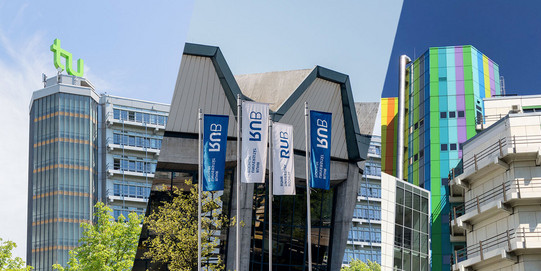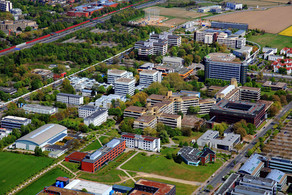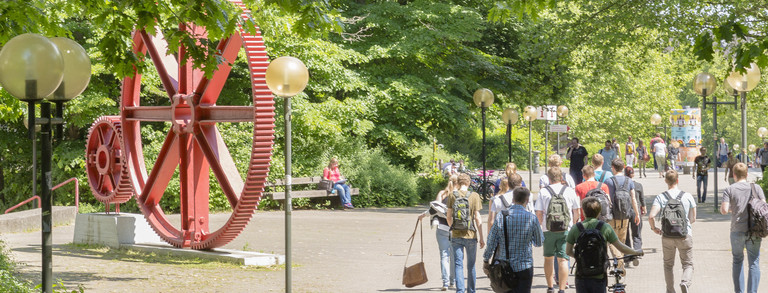Research Profile
TU Dortmund University is an internationally visible research university with a diverse profile of engineering and natural sciences as well as social sciences and humanities. Scientists at TU Dortmund University are dedicated to the topic of sustainability in all its breadth and research its ecological, social and economic dimensions. Detailed information on the research profile can be found on the research portal of TU Dortmund University:
Sustainability plays an important role in the research of various specialist areas at TU Dortmund University. For example, sustainability is the focus of two of the five Profile Areas of TU Dortmund University. In the profile area "Innovations for Sustainability and Health", new scientific and engineering technologies, energy industry research and solutions for resource-conserving, emission-reduced construction methods enable pioneering innovations for a sustainable future. Sustainability in the sense of resource-conserving use of materials is the guiding principle of research in almost all subject areas of the profile area. Examples of projects from the profile area are:
- the BMBF (Federal Ministry of Education and Research)-funded project "DIONA - Digitales Ökosystem für eine nachhaltige Kreislaufwirtschaft in der Automobilindustrie" (in German) or the
- EU projects "CIRCULAR FOAM" and
- "LAND4CLIMATE".
The profile area "Society and Transformational Processes in the 21st Century" focuses on well-founded analyses and innovative solutions for the social and societal challenges of the 21st century and thus the social dimension of sustainability. The research focuses range from fundamental questions on the structure, cohesion and transformation of societies and the future of education to conditions of social coexistence such as social cohesion, age, urbanity - and sustainability. Examples are:
- the interdisciplinary research area "From Prediction to Agile Interventions in the Social Sciences", FAIR
- the research training group "New challenges in ageing societies", funded by the Hans Böckler Foundation,
- as well as the VW project "Wealth as a Social Relationship. Intergenerational Aspects of the Familial (Re)Production of Wealth".
UA Ruhr

TU Dortmund University also conducts research into sustainability issues as part of the Research Alliance Ruhr (Universitätsallianz Ruhr, UA Ruhr). TU Dortmund University, Ruhr University Bochum and the University of Duisburg-Essen have been working closely together strategically in the UA Ruhr since 2007. With more than 100,000 students and almost 1,300 professors, the UA Ruhr is one of the largest and most productive science locations in Germany. By pooling complementary strengths, it is also possible to work on large, innovative and interdisciplinary fields of research, e.g. on sustainability.
As part of the"Energy System Transformation" field of expertise, the partner universities have been working together since 2019 to expand transdisciplinary energy research with a central focus on the interdisciplinary analysis of the overall system and, in particular, its transformation towards an energy system based on renewable energies. Furthermore, the DFG Research Training Group RTG 2484 "Regional Disparities and Economic Policy" deals with regional differences, e.g., in terms of income, education and health, and seeks solutions and recommendations for policy action. The RTG is thus doing pioneering work in the field of sustainable regional economics and the researchers at the UA Ruhr are addressing major societal challenges.
In Transregio (TRR) 391 “Spatio-temporal Statistics for the Transition of Energy and Transport”, TU Dortmund University and Ruhr University Bochum together with other partners, are developing innovative statistical methodologies to model and forecast data on the energy and mobility transition. The Collaborative Research Centre will thus make an important contribution to a better understanding of individual energy consumption and mobility behavior. Energy loads and grid disruptions can be predicted more accurately, the effects of environmental policy on energy prices can be analyzed, the management of logistics networks and supply chains can be improved and, as a result, (political) measures to reduce CO2 emissions can be optimized.
In addition to the UA Ruhr research cooperation and the research activities in the context of the profile areas, the establishment of an interdisciplinary research center "Sustainability", for example, could be an effective instrument for TU Dortmund University to work on the complex of topics with its new questions and to bundle competencies to solve the associated major societal challenges.





